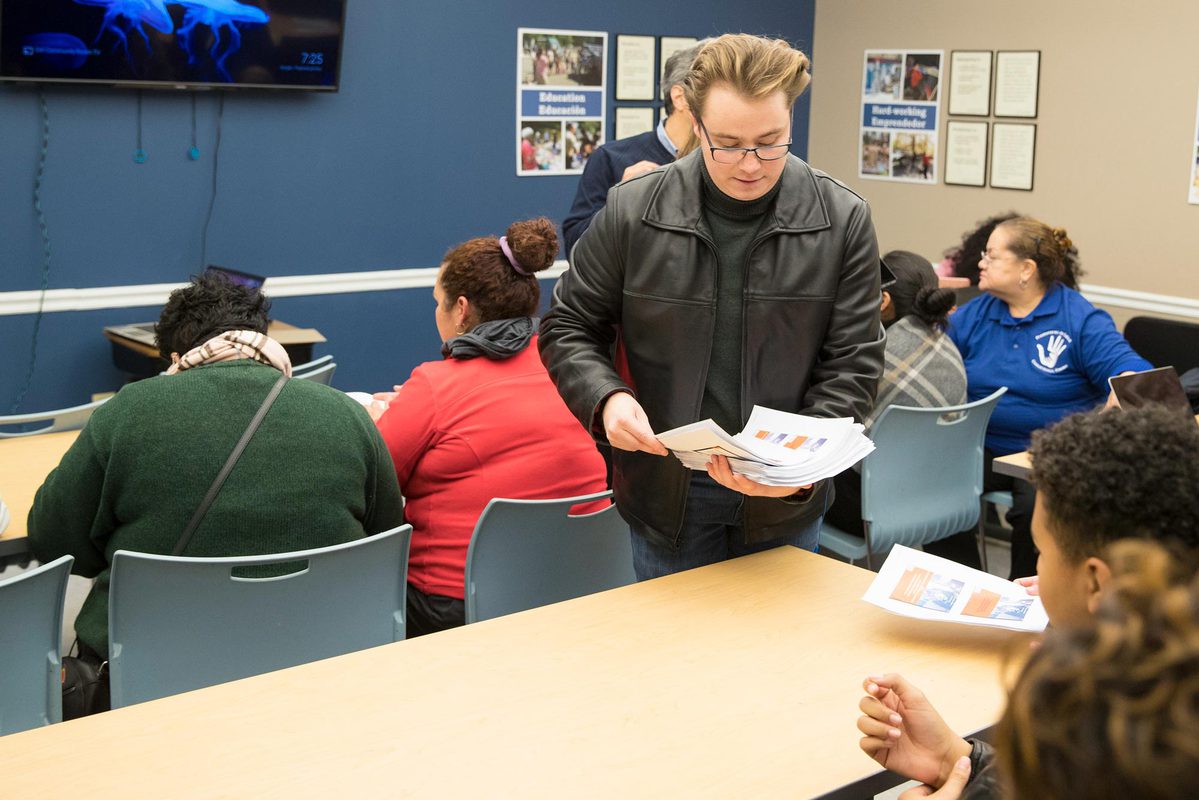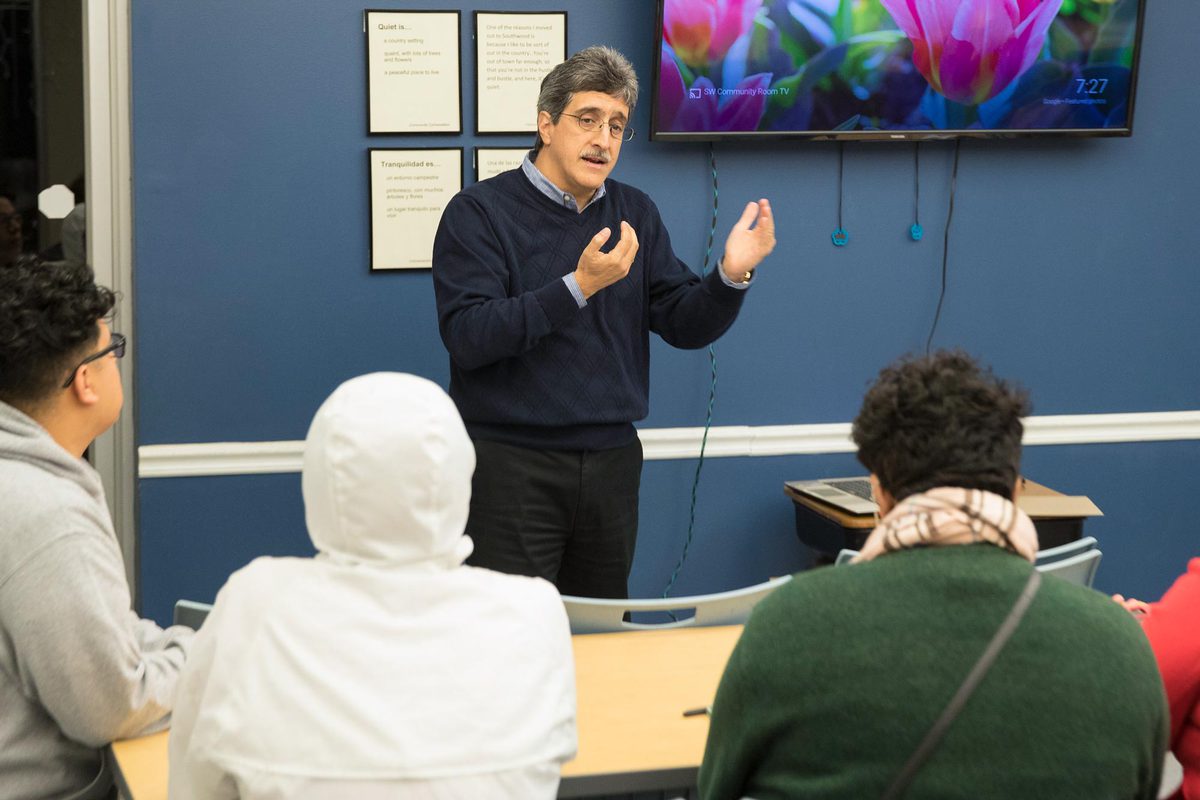The reason Alejandro Gonzalez made the 40-minute drive Wednesday night from his Greene County home to the Southwood Community Center, south of Charlottesville, was simple: He dreams of seeing one of his three children go to a four-year college.
But as someone who never went to college, and whose first language isn’t English, Gonzalez and his wife can only help so much in trying to turn the dream into a reality.
The college application process can pose many challenges. Inside a small room at the center, Gonzalez’s daughter, Cindy, faced her biggest test: the college essay.
“I’m hoping to get some inspiration to finally break the ice on it,” she said, smiling. “I’ve been suffering from writer’s block lately.”
Gonzalez, a senior at William Monroe High School, came to the right place. As part of a program put on by the University of Virginia’s newly established Equity Center, Gonzalez and a number of other high school students in and around Charlottesville got tips from Valerie Gregory, UVA’s associate dean of undergraduate admission, on how to write an essay, as well as the application process in general.
The evening also featured talks from associate professor of medicine Dr. Max Luna; Latino community members working in various fields; and UVA faculty members and students helped the high school students and their parents fill out Free Application for Federal Student Aid forms, better known as the dreaded “FAFSA.”
Another “FAFSA Party” was scheduled for Thursday from 6 to 8 p.m. at Charlottesville’s Mt. Zion First African Baptist Church on Lankford Avenue. (UVA's Office of Admission has many other outreach efforts reaching different communities around Virginia and all over the world, offering insight into the college admissions process.)

UVA faculty members and students helped high school students and their families fill out the Free Application for Federal Student Aid, or FAFSA.
“I’m very excited about this,” said Luna, a Guatemala native who directs the UVA School of Medicine’s Latino Health Initiative. “One of the biggest challenges in our community – both of color or underserved – is academic achievement. Having the Equity Center here in the Latino community, translating their work into the language with cultural competency, is what we want to do in different areas of the University.
“We’ve been in the community with the Latino Health Initiative for three years, and we’ve been thankfully welcomed into their communities, bringing health education, health services, health screening and assisting people to obtain affordable medical care. Now we’re collaborating with the Equity Center to narrow the gap of disparities in education, disparities in legal services, disparities in health services through this wonderful center that President [Jim] Ryan is supporting so greatly.”
After Luna addressed the group, an EMT, radiology technician, nurse, community health worker and medical student gave talks – all in Spanish – about how students, if they had interest, could go about pursuing careers in those fields.
“This is exciting for us,” said Bonnie Gordon, an associate professor music and Equity Center faculty director, “because this is a new way to partner and think about, intentionally, what the community wants and needs.
“We’re not so concerned about whether people go to UVA or not. We just want to help ensure that all kids and adults have access to the higher education they need.”
The nurse’s talk was of special interest to Gonzalez, who wants to get a nursing degree, then her master’s as an anesthetist or nurse practitioner.
The FAFSA component of the evening featured several UVA volunteers walking students and parents through the process on laptops.
“Just knowing the technology – a computer-based online application – can be challenging,” Luna said.
“But we also have mixed-immigration-status families. We have kids who are citizens that have access to federal funds, but parents who are undocumented; some have legal residence, and it’s a challenge to understand some of those questions when you have a mixed-immigration-status family. That’s what we’re trying to clarify here.”
Gloria Rockhold, who works in Albemarle County’s Office of Community Engagement, said filling out the FAFSA is vital.
“Even if they don’t use the FAFSA for getting the federal loans to universities, some of the private universities use the FAFSA form information and the students can apply independently for scholarships,” she said.
Gonzalez had already completed her FAFSA form. She was in attendance mainly to listen to Gregory.
During her talk, Gregory explained what college admissions departments look for in essays.
“The thing you just need to remember is, every single one of you has a story,” Gregory told the students. “So don’t try and think about what’s going to make it sound extraordinary. When you’re trying to tell your story, you have to home into something that’s really unique and specific about you that you would like colleges to know about you. What do you think that one unique thing is about yourself that you’d like to share?
“In writing these essays, don’t worry about writing the next best novel or trying to write like you do with your classes. Just put it in your own words and tell your story. That’s all we’re looking for. When you share the essay with friends and family, say, ‘Does this sound like me?’ I’ve read thousands of essays and the ones I remember the most are the ones who have told their story in the most simple way.”
Alejandro Gonzalez, who was seated toward the back of the room with his daughter, said he was glad he came to the event, which he had learned about on the radio.
“My wife and I told [Cindy], if you have questions, you have to talk with different people who can help you,” he said.
Born in Puebla, Mexico, Gonzalez has lived in the United States for 25 years. For the last 10, he’s worked for a heating and air conditioning company. Gonzalez’ father – Cindy’s grandfather – who also lives in Greene County, still works in maintenance at a manufacturing plant. Gonzalez said he often uses the fact as a point of reference as to why college education is so important.
“I tell my kids, when you’re about 55 or 60 years old, you can retire,” he said. “You don’t need to work that hard anymore. You can have a better life.”
Media Contact
Article Information
November 14, 2019
/content/uva-equity-center-and-running-fafsa-parties

